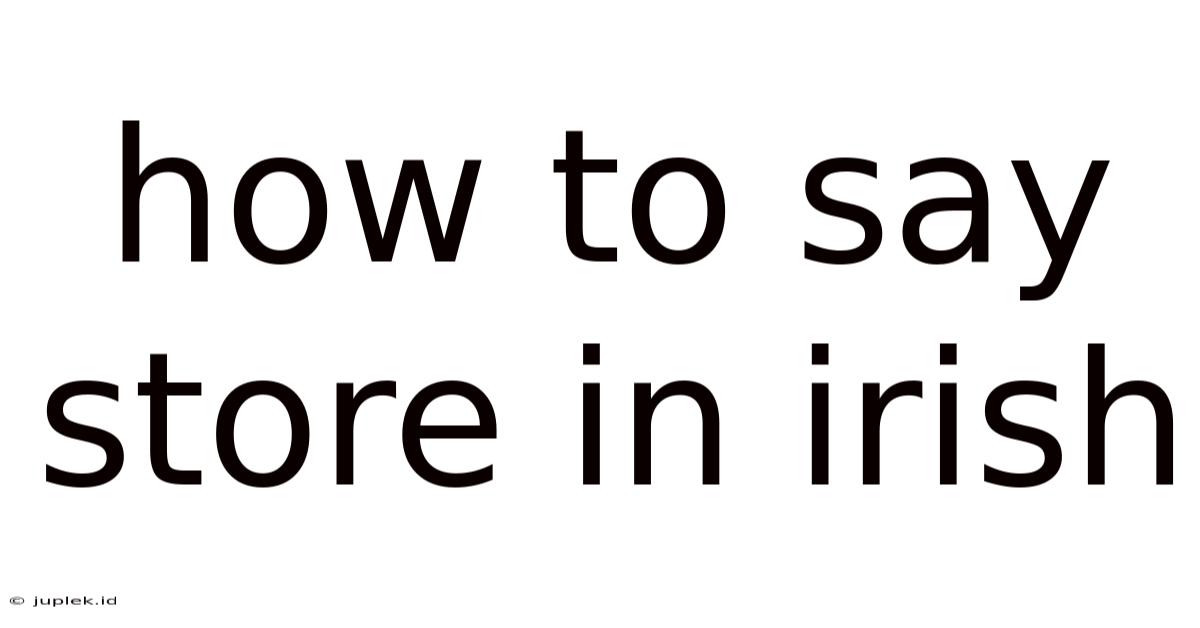How To Say Store In Irish

Discover more detailed and exciting information on our website. Click the link below to start your adventure: Visit Best Website meltwatermedia.ca. Don't miss out!
Table of Contents
How to Say "Store" in Irish: A Deep Dive into Shops, Shops, and More Shops
The seemingly simple question, "How to say 'store' in Irish," unveils a fascinating exploration into the nuances of the Irish language (Gaeilge) and its rich vocabulary. There isn't one single perfect translation for "store," as the best choice depends heavily on the type of store. This article will delve into the various words used, their regional variations, and the cultural context surrounding them, providing a comprehensive guide for anyone interested in learning more about the Irish language and its relationship to commerce.
The Core Options: A Starting Point
While there isn't a direct, universally accepted equivalent of "store," several words effectively convey the meaning depending on the context:
-
siopa (shop): This is probably the closest and most widely used equivalent to "store," particularly for smaller retail establishments. It's a versatile word applicable to a bakery (siopa bácála), a butcher's (siopa feola), a newsagent's (siopa nuachta), and many other small shops. It's generally understood and accepted throughout Ireland.
-
stór (store, treasure): This word carries a slightly different connotation. While it can refer to a store, especially a larger one, its primary meaning is "treasure" or "storehouse." Using it to refer to an everyday shop might sound slightly archaic or poetic. Think of it as referring to a place holding valuable goods, not just everyday items.
-
ceannach (buying, purchase): While not directly translating to "store," this word can be used contextually. You might hear phrases like "dul ag ceannach" (going shopping) or "áit cheannaigh" (a place to buy), where the latter implies a store or shop. However, it's not a standalone word for "store."
Delving Deeper: Context is Key
The best word to use heavily relies on what kind of store you're referring to. Here's a breakdown by category:
1. Grocery Stores:
-
siopa grósaeireachta: This is the most straightforward translation for "grocery store." It literally means "grocery shop."
-
margadh: This word means "market" and could be used for larger grocery stores or supermarkets, especially those with a wider selection beyond just groceries. Think of it as a more general term for a place where goods are sold in bulk.
2. Department Stores:
-
stór mhór: This translates to "big store" and is an appropriate term for larger department stores, hinting at their size and variety of goods.
-
siopa ollmhargadh: While "ollmhargadh" literally means "supermarket," it can also be used to refer to larger department stores with a wide selection of items.
3. Specialty Stores:
For specialty stores, you typically combine "siopa" with a descriptive word indicating the type of goods sold. For example:
- siopa leabhar: bookstore
- siopa éadaí: clothing store
- siopa bróg: shoe store
- siopa drugaí: drugstore/pharmacy (Note: cógaslann is also used for pharmacy)
- siopa crua-earraí: hardware store
Regional Variations: The Irish Language's Diversity
The Irish language is not monolithic. Different regions have their own dialects and variations in vocabulary. While "siopa" is widely understood, subtle differences in pronunciation or even preferred synonyms might exist. For instance, certain areas might favor a particular phrasing over another when referring to a specific type of store. This linguistic diversity adds to the richness of the language but requires sensitivity to context and location when choosing the most appropriate term.
Beyond the Words: Cultural Context
The choice of words also reflects a deeper cultural context. Using "stór" for a small convenience store might sound unusual, as it carries a weight and dignity associated with something more significant than a typical shop. Similarly, "margadh" brings to mind a bustling marketplace, a social hub where bargaining might be involved, rather than the more structured environment of a modern supermarket.
Practical Application: How to Use These Words
To demonstrate practical application, here are some example sentences:
- Tá siopa bácála ar an gcéad chúinne. (There's a bakery on the first corner.)
- Cheannaigh mé éadaí i siopa ollmhargadh. (I bought clothes in a department store.)
- Téimid go dtí an siopa grósaeireachta inniu. (We're going to the grocery store today.)
- Is breá liom an stór leabhar beag sin. (I love that little bookstore.)
Mastering the Nuances:
Learning how to say "store" in Irish isn't simply about memorizing a single word. It's about understanding the nuanced vocabulary and the cultural context behind each term. By paying attention to the type of store and the regional variations, you can effectively and accurately communicate in Irish, even when discussing everyday shopping experiences.
Conclusion: Embrace the Variety
The journey of learning how to say "store" in Irish reveals the beauty and complexity of the language. While "siopa" serves as a reliable starting point, exploring the synonyms, regional variations, and cultural nuances associated with different types of stores enriches your understanding and allows for more precise and culturally appropriate communication. Embrace the variety, explore the context, and enjoy the linguistic journey! Remember to practice regularly and engage with native speakers to further refine your skills. The more you immerse yourself in the language, the more natural and fluent your communication will become.

Thank you for visiting our website wich cover about How To Say Store In Irish. We hope the information provided has been useful to you. Feel free to contact us if you have any questions or need further assistance. See you next time and dont miss to bookmark.
Also read the following articles
| Article Title | Date |
|---|---|
| How To Say Plus In Mandarin | Apr 08, 2025 |
| How To Say Traeger | Apr 08, 2025 |
| How To Say Thank You For Inviting Me | Apr 08, 2025 |
| How To Say Hello In Venezuela | Apr 08, 2025 |
| How To Say Owls | Apr 08, 2025 |
